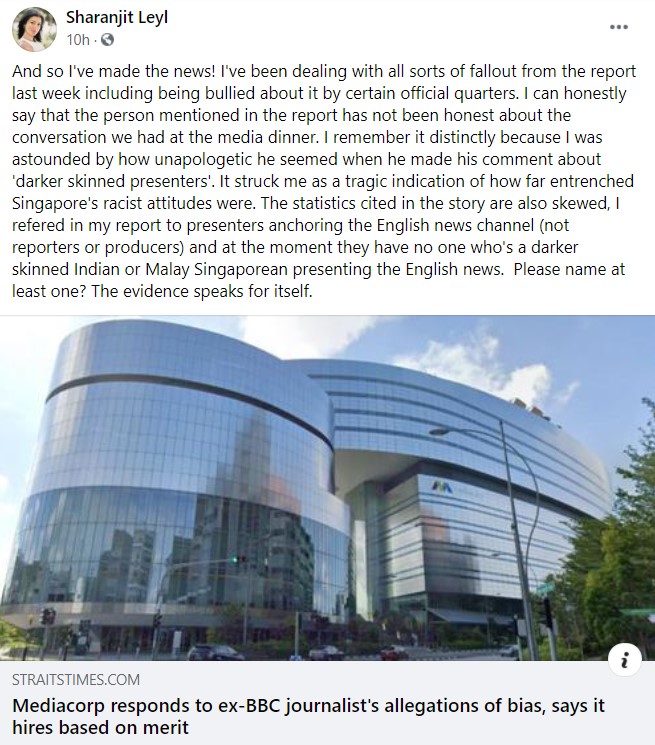Former BBC journalist of Punjabi and Sikh descent has alleged that she struggled to get a role as a newscaster at Mediacorp 20 years ago because of her skin colour. Sharanjit Leyl further alleged that its current editor-in-chief said “viewers didn’t like watching darker-skinned presenters”. Both the media conglomerate and executive in question have refuted the claims.
Singaporean journalist Sharanjit Leyl has slammed national broadcaster Mediacorp’s response to her accusations that one of its editors had said that “viewers did not like watching darker-skinned presenters”.
In a post in both her Facebook and LinkedIn accounts, the former BBC correspondent wrote: “I can honestly say that the person mentioned in the report has not been honest about the conversation we had at the media dinner”.

The 48-year-old, who left BBC News in June as a presenter-senior producer, had, during the weekend, said in BBC World Service radio series From Our Own Correspondent, that she struggled to get hired at a local news broadcaster some 20 years ago.
It was in a segment on racial harmony in Singapore.
Ms Leyl said she later “confronted the man who (now) runs the newsroom of that same TV channel, who ironically happens to be Indian Singaporean” on the topic of Indian and Malay presenters and alleged that he replied that viewers “didn’t like watching darker-skinned presenters”.
Mediacorp, in a statement to the media, said these comments appear to point to the company and its editor-in-chief Mr Walter Fernandez and clarified that Mr Fernandez did not make such a statement.
It also said it was unable to comment on what had transpired then without specific details, but added that it is committed to equal opportunities and diversity in hiring. This includes its on-air and on-camera talents, as well as behind-the-scenes crew and corporate employees.
Its dedicated news channel, CNA, has a diverse group of presenters, with some 30 percent from the minority group. It said that across the entire CNA newsroom, 40 percent are from the minority group and this is significantly above the national average.
Mr Fernandez also refuted these claims made by Ms Leyl, saying that “to [his] recollection, [he] did not reference race or skin colour at all”.
“What I did speak about was the number of Singaporeans with relevant skill sets who apply to be presenters, the rigorous selection process which includes written and on-camera tests as well as interviews with several senior editors”, he added.
Mr Fernandez only stated he was not part of the interview panel.
In response to Mediacorp’s statement and Mr Fernandez’s response, Ms Leyl said in her posts on Thursday, 12 August that “the statistics cited are skewed”.
“I referred in my [BBC] report to presenters anchoring the English news channel (not reporters or producers) and at the moment they have no one who’s a darker-skinned Indian or Malay Singaporean presenting the English news,” she writes.
She also said she was “astounded by how unapologetic [the man] seemed when he made his comment about darker-skinned presenters”, adding that it struck her “as an indication of how far entrenched Singapore’s racist attitudes were”.
“I can honestly say that the person mentioned in the report has not been honest about the conversation we had at the media dinner,” she added.
This spat comes at a time when Singapore has witnessed an increased number of racial attacks in both the public and online domains.
A former polytechnic lecturer was sacked when his racial attack on an Indian man and his Chinese girlfriend went viral. In another case, a Malay woman was jailed for making racist remarks towards an Indian woman on an SBS bus.
Jose Raymond, 50, and Chief Strategy Officer at strategy and communications advisory firm SW Strategies, says that Ms Leyl “has levelled some serious allegations against Mediacorp which warrants some attention by the news organisation”.
Mr Raymond, who was also the ex-Chairman of opposition political party Singapore People’s Party before retiring from politics, last December, added that if it is true that darker-skinned presenters are shunned because of their skin tone, it is “a travesty”.
“If viewers in Singapore really don’t like watching dark-skinned presenters, then we are doomed as a multicultural and multi-racial nation”, he adds.
TheHomeGround Asia has reached out to Ms Leyl for a comment and will update this story when she responds.
Join the conversations on TheHomeGround Asia’s Facebook and Instagram, and get the latest updates via Telegram.














